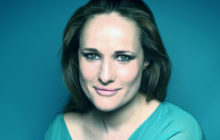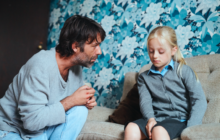Ana Rocha de Sousa: Caring about others is key today
10. November
A family of Portuguese immigrants is making ends meet in a London suburb, when a set of circumstances sets social services upon them. Their turbulent everyday life turns into a psychological thriller. Listen is a cry against institutional sociopathy, and in this year’s ZFF feature competition it will be available for viewing from Wednesday to Thursday. We talked about the methods behind the chaos with Ana Rocha de Sousa, director and winner of best debut award this year in Venice.
Interviewer: Danijel Brlas
Caring about others – a child, sister, or community – is a recurring theme in your films.
Caring about others is key today. If there’s one thing we need to adopt in this crazy year is the fact that we need to care for each other. Maybe this pandemic is trying to teach us exactly that. In my films I explore topics which are very close to me. Family separation, what it means to live again, dealing with distances… In the end, love helps us overcome all difficulties.
To whom or what does “listening” refer to in the film’s title?
It refers to each and every one of us. It has all the layers of meaning you can think of. “Listen” refers to the act of listening itself as a basis of understanding; to be able to feel like another, to empathize. It also refers to the deaf administrative system which lack empathy and cannot overstep rules and become perfectly human. It also refers to an exceptional young deaf girl who is the only one who can really “listen”, who is constantly observing and analysing the world around her and tries to connect, understand and communicate. It also refers to the story about this family which desperately needs understanding and support, and to all the other real families who are going through the trauma of forced adoption, whose voices are taken away and not listened to. All of those layers are intertwined. Listen is not easy, but it’s incredibly powerful.
With your observations, the film resembles a documentary, and thanks to the lack of detailed exposition, the characters are more real than the usual templars and martyrs to which we are used to in these kinds of stories. What lead you this approach?
It’s more of a distinctive way in which I experience the world. Those are skills I have developed since I was little. I grew up in a place which was open to different cultures and I was always curious. By carefully observing your surroundings you get the most incredible discoveries. You learn something about life while sitting in a café, standing at a bus station, or walking around a museum. We don’t need to change what we show, but the way we watch it and how we feel.
Before directing, you were a renowned actress and painter. How did those two very different artistic expressions affect your style as a director?
I find these and some other artistic forms are key to my development as a director. There are some techniques which will lead you to the status of a film genius faster than the ones I’m using. My creative choices rarely follow prescribed norms and I don’t try to keep absolute control. I try to leave space for freedom, which is not usual on a film set. I concentrate on actors’ performances and how to tell the story through them more than on the fact if all my elements are perfectly set in the shot. I think that really shows in my work. When I can choose, I choose heart over reason. Soul over rules. Emotions, not just ideas. My technique is free and it always leads me to things worth searching for.











